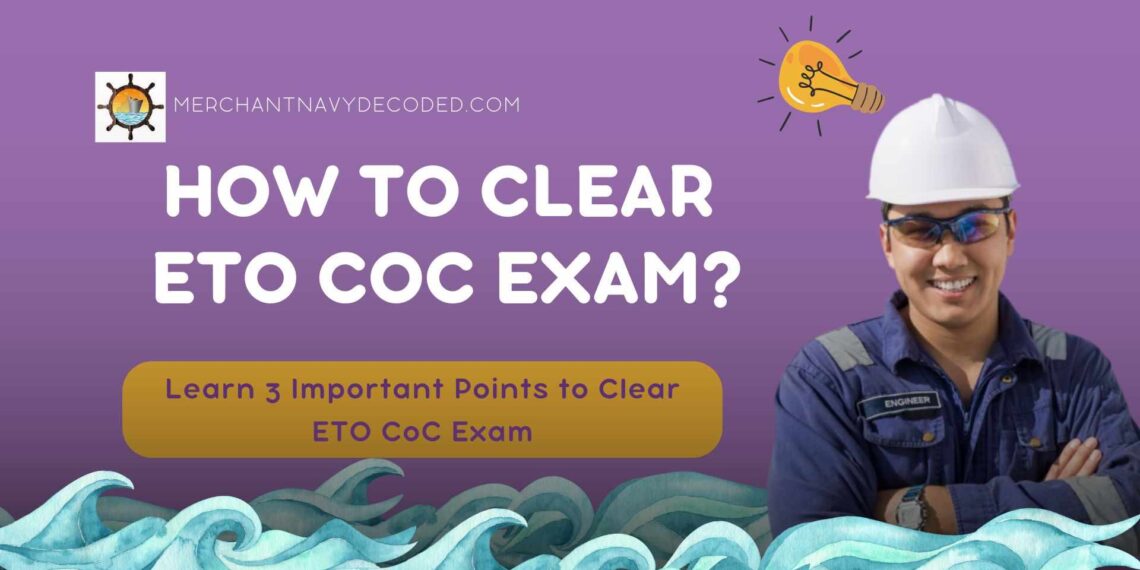How to Clear ETO CoC Exam in 2024
Table of contents
1. Overview
- Preparing for the ETO CoC (Electro-Technical Officer Certificate of Competency) examination requires comprehending educational prerequisites, obtaining study resources, and learning exam techniques. Meeting qualifying requirements, registering with DG Shipping, and budgeting for courses and examinations are all necessary tasks.
- Candidates must understand the duration and expense of training courses and ETO CoC examination to ensure their preparation for a job in maritime engineering.
- Using study aids, practice examinations, and internet tools improves preparation for success. With careful study and smart preparation, aspirants can successfully achieve the ETO CoC, clearing up the path for profitable jobs in electro-technical engineering at sea.
2. Tips to Clear ETO CoC

- Practice Numerical Questions
- Numerical questions are an important aspect of the examination. Make sure you have time to practice solving numerical problems in electrical engineering, circuits, and control systems.
- Use tools like textbooks, online courses, and practice exams to improve your numerical abilities to increase your chances of clearing the ETO CoC examination.
- Previous Year’s and Latest Sample Question Papers
- Familiarise yourself with the format and types of questions from previous years’ tests in ETO CoC.
- Join Telegram groups where candidates discuss concepts and questions from recent tests.
- Solving these problems will give you an overview of the exam format and help you select key topics to focus on.
- Improve Writing Speed and Theory Comprehension
- Improve your writing speed by practicing theoretical problems with a pen and a notebook. This exercise not only enhances your speed but also helps you remember and understand theoretical topics better.
- Focus on maritime control technologies, electrical engineering concepts, and safety requirements.
- Emphasize Diagrams in Answers
- Diagrams and other graphical representations are essential for successfully communicating technical knowledge.
- Practice designing neat and clean diagrams for electrical circuits, equipment, and systems. Incorporate these illustrations into your responses to improve clarity and demonstrate your grasp of the subject.
- Engage in Group Discussions and Practice Orals
- Join group conversations or study circles to practice your speaking skills. Discuss and prepare probable oral questions about Marine Control Technology, Marine Electrical Technology, and regulatory requirements.
- Practice answering questions clearly and smoothly, using both theoretical knowledge and personal experiences.
Unlock your path to success in clearing ETO and MEO Electrical CoC exams with our ETO and MEO Electrical CoC Course
3. How to Prepare for ETO CoC Exam

3.1:- Written Exam Preparation
- Join Telegram Groups for Latest Questions: Join Telegram groups for ETO CoC exam preparation to stay up to speed on the newest trends of questions.
- Collect and Solve Past Year Papers: Gather and solve past years’ question papers to better grasp the test format and practise answering problems under limited time.
- Topic-wise Preparation: Create a study schedule that focuses on certain topics such as electrical systems, control mechanisms, safety standards, and regulatory compliance.
- Analyze and Create Your Answers: Analyse answers from trustworthy sources, such as Google or study notes, to gain an improved understanding of theoretical subjects. Create your answers to frequently asked questions to improve your understanding.
- Daily Revision and Practice: Set up time each day to revise previously learned material and practice answering questions. Regular revision helps strengthen learning and increase retention.
3.2:- Oral Exam Preparation
- Read Relevant Books: Get a solid basis in electrical engineering fundamentals by studying important texts such as Marine Electrical Technology and Marine Control Technology.
- Familiarize with Specific MMD Questions: Know the common questions asked by the Maritime Mercantile Department (MMD) where you plan to take the test.
- Focus on Safety and Regulations: Prioritise safety measures, regulations, and compliance requirements for marine electrical systems.
- Practice Confidence and Fluency: Participate in group conversations and speak loudly to improve your oral communication abilities. Practice phrasing and answering questions in your own words to enhance fluency and coherence.
- Incorporate Personal Experiences: Whenever feasible, use your onboard experiences to give practical insights and examples while answering oral questions. Connecting theoretical principles to real-world events displays a greater comprehension of the subject.
- Find out whether you are eligible for MEO or ETO CoC with a click with the help of MEO and ETO CoC Eligibility Checker by Merchant Navy Decoded.
4. When to Start Preparation for ETO CoC

- Begin your preparation for the ETO CoC exam after completing advanced courses and assessments, typically around 8 months into your training.
- Dedicate at least one hour daily to cover the syllabus comprehensively, focusing on both theoretical understanding and practical application.
By following these tips and strategies, you can effectively prepare for and clear the ETO CoC exam, ensuring proficiency in electro-technical engineering and compliance with maritime regulations.
5:- Conclusion
- As a recap, achieving the Electro-Technical Officer Certificate of Competency (ETO CoC) includes achieving educational requirements, completing training, and passing examinations.
- Visit the DG Shipping website to register and remain informed about course durations and pricing.
- Understanding these characteristics is critical for successful preparation. Candidates can successfully acquire the ETO CoC by answering common questions and studying attentively.
ETO CoC FAQs
- What are the eligibility criteria to apply for ETO CoC exams?
Applicants must meet the following criteria:
- Completion of Diploma/B-Tech (3 years for DG Shipping eligibility, 4 years for other institutions).
- Completion of a 4-month pre-sea course and 8 months of onboard training.
- Completion of 3 advanced courses, with the option of High Voltage (HV) for those sailing on ships equipped with high voltage systems.
- How do I register for the ETO CoC exam on the E-Pariksha Portal?
- There is no E-Pariksha Portal for ETOs. To apply for the exam, candidates need to log in to the DG Shipping website and navigate to the examination section. Options available include updating the profile, booking exam slots, checking results, etc.
- What is the average cost of ETO CoC courses and exams?
- The average cost breakdown is as follows:
- Advance STCW: ₹13,000 – ₹20,000
- High Voltage (Management): ₹10,000 – ₹15,000
- Eligibility assessment: ₹3,000
- Written Exam: ₹4,500
- Oral Exam: ₹4,500
- CoC application: ₹3,000
- Total approximate cost: ₹37,000 – ₹50,000
Additional expenses for food, travel, and lodging (if extra attempts are required) are approximately ₹50,000, bringing the total to around ₹1 lakh.
- What is the duration of each course and assessment exam?
The duration of each course and assessment exam is as follows:
- AFF (Advanced Fire Fighting): 5 days
- MFA (Medical First Aid): 4 days
- PSCRB (Proficiency in Survival Craft and Rescue Boats): 5 days
- Management High Voltage: 5 days
- Operational High Voltage: 2 days
- What documents are required for the ETO CoC exam application?
- Applicants typically need to submit copies of their educational certificates, completion certificates for pre-sea and onboard training, advanced course certificates, proof of eligibility assessment, and other relevant documents as specified by DG Shipping.
Disclaimer :- The opinions expressed in this article belong solely to the author and may not necessarily reflect those of Merchant Navy Decoded. We cannot guarantee the accuracy of the information provided and disclaim any responsibility for it. Data and visuals used are sourced from publicly available information and may not be authenticated by any regulatory body. Reviews and comments appearing on our blogs represent the opinions of individuals and do not necessarily reflect the views of Merchant Navy Decoded. We are not responsible for any loss or damage resulting from reliance on these reviews or comments.
Reproduction, copying, sharing, or use of the article or images in any form is strictly prohibited without prior permission from both the author and Merchant Navy Decoded.




